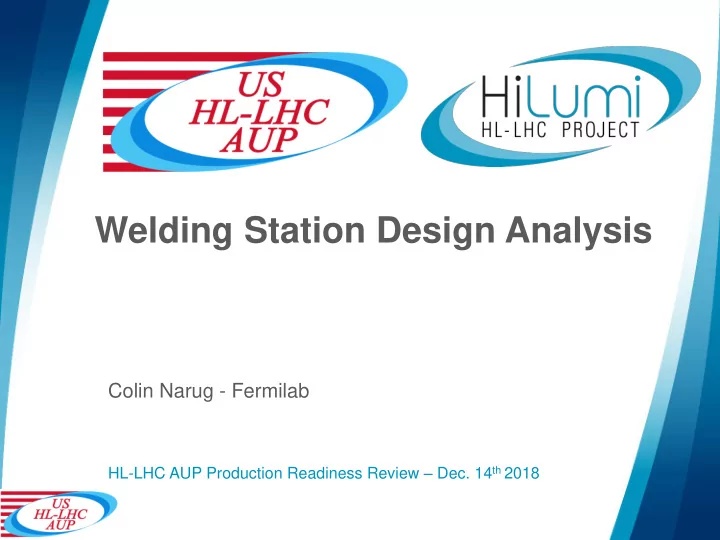

Welding Station Design Analysis Colin Narug - Fermilab HL-LHC AUP Production Readiness Review – Dec. 14 th 2018
Overview ▪ Requirements ▪ Areas of Interest ▪ FEA Setup ▪ Simulation Results ▪ Leveling Feet Results ▪ Weld Calculation Results ▪ Results Summary ▪ Backup Slides HL-LHC AUP Production Readiness Review – Dec 2018 2
Requirements ▪ The cold mass will be supported by 5 weld stations ▪ Each weld station will have 2-4 saddle supports ▪ Weight of cold mass is effectively evenly distributed ▪ Weld stations should minimize deformation ▪ Stress on all components should be below the allowable yield ▪ A combination of FEA and manual calculations was performed to verify design requirements HL-LHC AUP Production Readiness Review – Dec 2018 3
Areas of Interest ▪ Stress in Frame ▪ Saddle Support Deformation ▪ Leveling Feet ▪ Welds ▪ Only on the sections supporting the saddle support HL-LHC AUP Production Readiness Review – Dec 2018 4
Simulation Setup ▪ Simulation ran for each weld station configuration ▪ 5 weld stations ▪ 3 different configurations of saddle supports ▪ Load on each saddle support was calculated ▪ Models cleaned and imported into ANSYS 18.2 HL-LHC AUP Production Readiness Review – Dec 2018 5
Simulation Setup ▪ Models meshed ▪ Between 672K – 723K Nodes ▪ Boundary conditions applied ▪ Calculated reaction forces on each saddle support ▪ Fixed supports ▪ 6 for leveling feet ▪ 4 for alignment bolts ▪ Gravitational acceleration HL-LHC AUP Production Readiness Review – Dec 2018 6
Simulation Setup ▪ Model setup for the 5 different configurations ▪ Properties solved for: ▪ Equivalent Stress ▪ Total Deformation ▪ Horizontal and Vertical Deformation ▪ Force Reactions: ▪ For welds of interest ▪ Fixed supports Material Density (g/cc) Modulus of Elasticity (GPa) Possion's Ratio Bulk Modulus (GPa) Shear Modulus (GPa) Allowable Yield (MPa) ASTM A500, Grade B 7.8 160 80 157.5 205.71 0.286 ASTM A36 Steel 7.8 200 0.26 138.8 79.4 125 6061-T6 Aluminum 2.7 68.9 0.33 67.5 25.9 137.5 HL-LHC AUP Production Readiness Review – Dec 2018 7
Deformation Results HL-LHC AUP Production Readiness Review – Dec 2018 8
Stress Results HL-LHC AUP Production Readiness Review – Dec 2018 9
Simulation Results Summary ▪ Across all models, deformation and stress are within requirements ▪ Peak stresses are located at critical weld locations ▪ Minimal energy loss through model ▪ Results similar to initial calculations performed HL-LHC AUP Production Readiness Review – Dec 2018 10
Deformation Results ▪ Deformation along cold mass is within requirement HL-LHC AUP Production Readiness Review – Dec 2018 11
Swivel Leveling Mount Verification ▪ Maximum force reaction across all models at fixed supports found ▪ Safety Factor calculated for the capacity of the swivel leveling mount 𝑁𝑏𝑦𝑗𝑛𝑣𝑛 𝑊𝑓𝑠𝑢𝑗𝑑𝑏𝑚 𝑀𝑝𝑏𝑒 = 7,400 𝑚𝑐𝑡 𝑀𝑝𝑏𝑒𝑗𝑜 𝐷𝑏𝑞𝑏𝑑𝑗𝑢𝑧 𝑇. 𝐺. = 2,242 𝑚𝑐𝑡 = 3.3 ▪ Safety factor indicates there should not be an issue HL-LHC AUP Production Readiness Review – Dec 2018 12
Weld Results ▪ Weld material used is ER70S-6 ▪ Allowable stress of 162 MPa ▪ Shear on load found through calculations and FEA results ▪ Manual calculations lead to larger force reactions ▪ Rail across bar helped reduce reactions ▪ Manual calculations used for final results HL-LHC AUP Production Readiness Review – Dec 2018 13
Results Summary ▪ Results adhere to requirements ▪ Realistic results may be different than simulations HL-LHC AUP Production Readiness Review – Dec 2018 14
Backup Slides ▪ Weld Station 2 Simulation Results HL-LHC AUP Production Readiness Review – Dec 2018 15
Backup Slides ▪ Weld Station 3 Simulation Results HL-LHC AUP Production Readiness Review – Dec 2018 16
Backup Slides ▪ Weld Station 4 Simulation Results HL-LHC AUP Production Readiness Review – Dec 2018 17
Backup Slides ▪ Weld Station 5 Simulation Results HL-LHC AUP Production Readiness Review – Dec 2018 18
Backup Slides ▪ Position and reaction forces of spherical supports HL-LHC AUP Production Readiness Review – Dec 2018 19
Backup Slides HL-LHC AUP Production Readiness Review – Dec 2018 20
Backup Slides ▪ Weld Calculations: ▪ Reaction forces from saddle supports: 𝑆 1 = 𝐺𝑐 2 3𝑏 + 𝑐 𝑚 3 𝑆 2 = 𝐺𝑏 2 3𝑐 + 𝑏 𝑚 3 𝑁 1 = 𝐺𝑏𝑐 2 𝑚 2 𝑁 2 = 𝐺𝑏 2 𝑐 𝑚 2 ▪ Weld Area: 𝐵 = 1.414ℎ𝑒 𝐽 𝑣 = 𝑒 3 6 𝐽 = 0.707ℎ𝐽 𝑣 ▪ Weld Stress: 𝜐 ′ = 𝑆 𝐵 𝜐 ′′ = 𝑁𝑑 𝐽 𝜐 = 𝜐 ′2 + 𝜐 ′′2 1/2 HL-LHC AUP Production Readiness Review – Dec 2018 21
Backup Slides ▪ Weld Calculation Results: HL-LHC AUP Production Readiness Review – Dec 2018 22
Backup Slides ▪ Weld Simulation Reaction Forces HL-LHC AUP Production Readiness Review – Dec 2018 23
Backup Slides ▪ Convergence Study for Weld Station 1 ▪ Study shows that while convergence was not fully reached, the stress was near the true value ▪ Since the peak stress at a weld location, it is assumed that the weld calculation would be more accurate HL-LHC AUP Production Readiness Review – Dec 2018 24
Backup Slides ▪ Drawings HL-LHC AUP Production Readiness Review – Dec 2018 25
Backup Slides ▪ Drawings HL-LHC AUP Production Readiness Review – Dec 2018 26
Backup Slides ▪ Drawings HL-LHC AUP Production Readiness Review – Dec 2018 27
Backup Slides ▪ Drawings HL-LHC AUP Production Readiness Review – Dec 2018 28
Backup Slides ▪ Drawings HL-LHC AUP Production Readiness Review – Dec 2018 29
Backup Slides ▪ Drawings HL-LHC AUP Production Readiness Review – Dec 2018 30
Recommend
More recommend